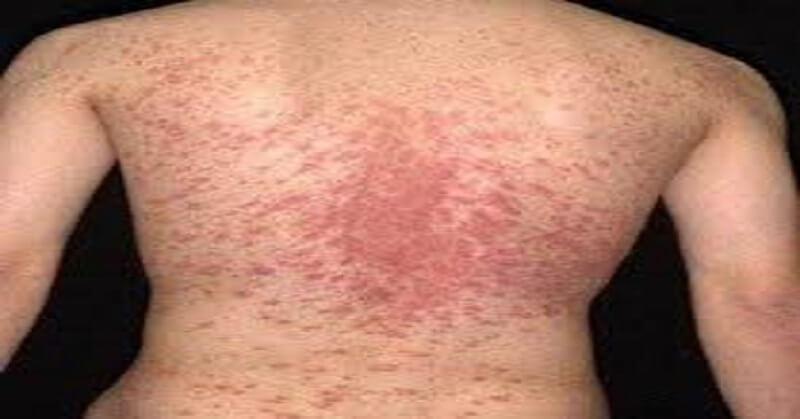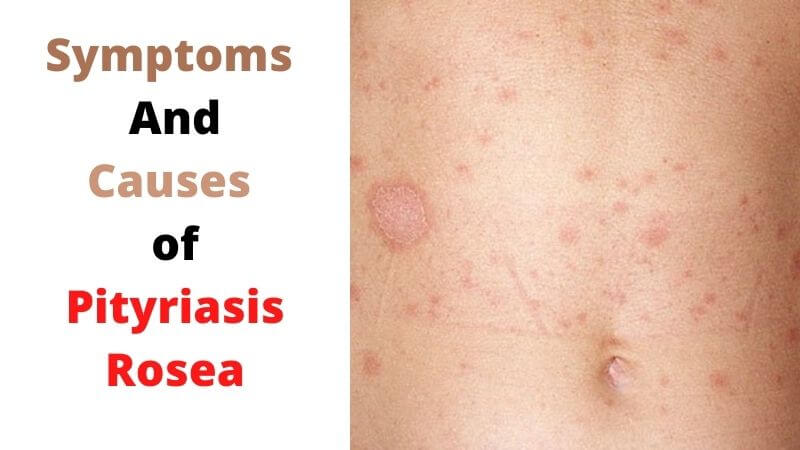Pityriasis Rosea is a common rash that appears on the back, stomach, or chest area. It is also called Christmas Tree rash. It usually starts with one larger patch and spreads into smaller patches to the other parts of the body. The first patch is known as the mother patch and other patches are called daughter patches. The mother patch is also called a herald patch. These patches may be red, scaly, and itchy. Mostly these patches disappear in 4 to 10 weeks without any treatment. If it is itching more it is good to consult a doctor and get proper treatment. Some topical treatments and supplements may suggest by your doctor. In most cases, it will not recur, only 25% of people experience recurrence, one study explains. In this article, We will focus on Pityriasis Rosea Foods To Avoid, its symptoms, and causes in detail.
Symptoms Of Pityriasis Rosea
Other than mild itching, other symptoms like fatigue, nausea, headaches, sore throat, and fever can occur during the rash or before the condition starts. It begins with a single large patch and spreads into smaller patches on the body parts of the back, chest, stomach, neck, arms, and legs.
The patches seem to be red, scaly, and itchy. It usually occurs in the age group of 10 to 35 years old. It can treat with topical steroids, antihistamines, and light therapy to reduce the itching symptoms.
The intensity of itching may increase when you exercise or take hot showers. The itching can increase your stress hormones. In some people, you can see reduced appetite. If you are in good health condition you may not exhibit other than a mild rash.
Cause Of Pityriasis Rosea
The actual cause of Pityriasis Rosea is unknown. Some evidence shows that the rash may occur due to viral infection and that too certain strains in the herpes virus are the main reason behind this. It is not contagious.
This medical condition can last for 6 to 8 weeks and recur in a few cases. Following a proper diet can reduce the impact and symptoms of Pityriasis Rosea. Avoiding certain foods can reduce the intensity and frequency of occurrences. Let us go into detail about it.
Pityriasis Rosea Foods To Avoid
According to many studies, there is no relationship between diet and its effect on Pityriasis Rosea.
The experts are suggesting adopting an anti-inflammatory diet is best for skin problems. It also reduces the symptoms of Pityriasis Rosea. The anti-inflammatory diet is good to follow the autoimmune protocol diet or AIP diet. It involves eliminating certain foods causing gut inflammation and replacing them with nutritious food.
What are foods that can avoid reducing the symptoms of pityriasis rosea? Pityriasis Rosea foods to avoid based on the AIP diet are grains, legumes, potatoes, tomatoes, peppers, dairy products, coffee, alcohol, nuts, and seeds. And also add processed sugars and oils, preservatives, salt, and sugar to the list.
There is another suggestion that eating antioxidant-rich food can reduce oxidative stress. Some people are relating oxidative stress to pityriasis rosea that the increased oxidative stress can increase pityriasis rosea symptoms. But still, it is in theory only, there is no evidence-based research on this.
Mentioned pityriasis rosea foods to avoid items may help you to stop certain foods to improve this medical condition.
In addition to this adding certain foods to your diet will help you treat pityriasis rosea.
- Add vitamin D-rich foods to your diet
- Turmeric can also add. They help in treating dry and itchy skin
- Bilberry is also good for itchy skin.
You can take either as food or supplements. They are good for skin health.
Treatments for Pityriasis Rosea
Usually, pityriasis rosea does not require any treatment to reduce the risk of symptoms. It can heal on its own in 4 to 10 weeks. If it persists after 10 weeks or symptoms stills appear on the skin, you need to talk with a medical practitioner. Rashes can go away without leaving any scarring and they will not recur. Treatments that medical practitioners can provide are;
Medication
Your doctor may prescribe medications such as corticosteroids and antihistamines. They might help to get relief from inflammation, itching, redness, and allergic reactions
Light Therapy
Ultraviolet radiation from artificial sources or direct sunlight can reduce the duration of rash and intensity of itching in a patient with pityriasis rosea. Exposing your body to this ultraviolet radiation is called light therapy. Sometimes this light therapy may cause dark spots or scare even after the rash clears.
Lifestyle And Home Remedies
- You can try some home remedies and lifestyle changes to reduce the symptoms of pityriasis rosea.
- You can take over-the-counter antihistamines such as diphenhydramine, Benadryl, and others for itching.
- You can take lukewarm baths or showers. And also can try bathing by sprinkling some oatmeal in bath water.
- Avoid wearing cotton and silk, it can reduce heat and itching.
- Natural sunlight exposure for 10 to 15 minutes a day can reduce the itching
- Lubricate with calamine lotion or bland moisturizer. And can also apply over-the-counter corticosteroid cream.
- Apply sunscreen to protect the skin from direct sunlight.
- Avoid drying soaps, hot water, wool, and synthetic fabrics.
- Apply menthol cream or ointment to keep you cool and soothe.
Pityriasis Rosea And Pregnancy
Pityriasis rosea can cause miscarriage if it occurs within the first 15 weeks and also it is possible for premature delivery. Since there is no exact treatment for this condition, the doctor may prescribe acyclovir to inhibit viral replication.
Conclusion on Pityriasis Rosea Foods To Avoid
In a conclusion, you can undergo any topical treatments and medication to reduce pityriasis rosea skin rashes. Along with that adopting a healthy diet can help further in treating the medical condition. Avoiding certain foods can improve the condition and can also support medical treatment. Since there is no clear evidence of diet planning, it is always good to consult a doctor before any diet.Source
Also Read: Check Out Top 9 Blood Type B Diet Food List
Follow Us: Facebook | Instagram | Twitter | Youtube | Pinterest
Tinydale is on YouTube, Click here to subscribe for the latest videos and updates.
The article written by me is for information purposes only. It is not intended to provide medical advice. The reader should always consult a Medical practitioner concerning any medical condition.


